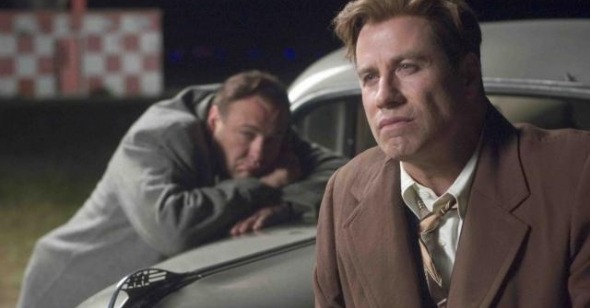Dry Rot
by Nick Pinkerton
Lonely Hearts
Dir. Todd Robinson, U.S., Roadside Attractions
Lonely Hearts revisits the story of Martha Beck and Raymond Fernandez, tabloid darlings who spent 1948 exploring America, leaving a trail of scammed or slaughtered divorcees, widows, and spinsters behind them. Flimflam romeo Ray was just doing his old serial seduction thing, picking marks from their personal ads, but teaming with hard-luck girlfriend Martha, who posed as his sister, raised the stakes of his confidence game considerably; they eventually went to the chair in Sing Sing convicted of three murders, ostensibly connected to 20. Writer-director Todd Robinson’s film inexplicably brings together a bevy of bankable names around the case, with Salma Hayek and Jared Leto as Beck and Fernandez, and John Travolta and James Gandolfini as Detectives Robinson and Hildebrandt, a pair of Long Island detectives drawn onto their case.
The Beck-Fernandez killings, which launched a thousand headlines in their day, have been filmed more than once already, most notably as 1970’s Guignol The Honeymoon Killers, with fat Brooklyn-born harridan Shirley Stoler playing a Beck significantly closer to the dowdy truth (you couldn’t really call Robinson’s film a romanticizing of the case—Hayek’s characterization is monstrous—but it does doll up the personnel a bit). Lonely Hearts’ original “angle” comes in its paralleling Beck-Fernandez’s grandly dysfunctional fumbling at domesticity with Det. Robinson’s own clumsy attempts to reconstruct his fragmented personal life—his wife commits suicide over the opening credits, and he has a strained-to-breaking relationship with his young son—matching two damaged family units pushed to the outer limits of alienation by what they’ve done and seen, compelled even at the torturous extremity of their circumstances to imitate normalcy. Martha, seeking a palpable note of permanence and fidelity in an existence built around perpetual Don Juan-ism, is suddenly stricken with the desire to settle down and have a baby, as if picket-fence redemption is still possible with her and Ray a few dead bodies past the point of no return.
It could be the premise for a great Nick Ray picture, but though Robinson’s division of screen time between the fugitives and their pursuers seems to come from the most honorable of motives (Travolta is playing the director’s grandfather, who worked on the Beck-Fernandez case), he never manages to open a dialogue between the storylines before they converge, and over-reliance on Gandolfini’s narration suggests the director was out of his depth. The filmmaking is confident, if anonymous, throughout—the air of two-and-a-half-star mediocrity is unmistakable—though the taciturn Travolta chapters fare worst, lacking even the trace of outlaw tawdriness that gooses the scenes between Hayek and Leto. Material surrounding Travolta’s solemn, incognito office romance (Laura Dern) and station house roughhousing is utterly rote; there’s one good visual gag that plays on the mismatched weight classes of Gandolfini and Scott Caan’s prick inspector when they start to mix it up, but the rest is obligatory macho put-downs (“I fucked yer muddah,” et al.)
As for Fernandez and Beck, in a story that offers access to the entire dreamlife and romantic ideals of a distant decade, we have to settle for scurrilous True Crime; Lonely Hearts’ title may recall Nathaniel West, but the ideas are strictly straight-to-video. Leto, between his receding-hairline getup here and his bulked-up Mark David Chapman in the upcoming Chapter 27, seems to be dead-set on selling himself as an important actor through attention-getting chameleonic parts—but though his pouty fronting of a smeared-eyeliner tween rock outfit makes him an easy punchline, this film’s only real pathos comes by way of his tatty, low-rent gigolo. Ray’s morally retarded wakeup, long after Martha’s violent possessiveness has irretrievably sucked him into its undertow, is communicated through tiny winces of crushed clarity; it’s a sharp piece of characterization set amidst utterly dull surroundings.
